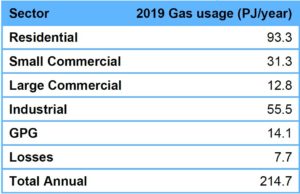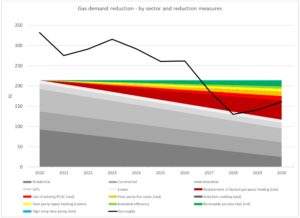Victorians are the largest gas consumers in Australia. If we don’t correct course, our winter gas needs could outstrip supply by 2024. Short-sighted politicians and commentators think the only way to address this potential supply crunch is finding new sources of gas supply. But there’s another way.
It is time to shift how we think about gas
Gas is a polluting and expensive fossil fuel. To do our fair share in reducing greenhouse gas emissions and avoid the worst consequences of climate change, we must get off gas. Right now, the Victorian government is considering new sources of gas supply being pushed by energy companies – including opening new conventional onshore gas fields and AGL’s plans for a floating gas import terminal in the middle of a Ramsar-listed wetland. But there’s a better way of meeting our energy needs.
Environment Victoria commissioned a report that outlines how Victoria can balance gas supply and demand and reduce household bills without opening new gas fields or polluting gas import terminals.
Decades ago, using gas to heat our houses, cook our food and warm our water was cheaper and less polluting than using electricity, especially considering the brown-coal-dominated Victorian electricity grid.
But now, as we put more renewable energy into the grid and have more rooftop solar to power our homes directly, using efficient electric appliances is cheaper and better for the climate than using gas. This is also better for our environment, as gas extraction projects continue to damage our precious natural places across the world.
Gas is a polluting and expensive fossil fuel. To do our fair share in reducing greenhouse gas emissions and avoid the worst consequences of climate change, we must get off gas.Click To TweetOther places are moving away from gas
Governments around the globe are taking note of the financial and environmental benefits of switching gas appliances to efficient electric ones. An ever-increasing number of cities and regions are looking to wean off gas as part of their strategies to reduce greenhouse gas emissions and to help households cut their energy bills.
In Amsterdam, councils have decided to go gas free by 2040. Despite being, like Victoria, a former gas exporter and a cold-weather region with a large number of gas connections, they are not looking for new sources of gas supply, unlike the Andrews government here.
This isn’t just happening in Europe. Many cities in the US, including Berkeley, San Jose, San Francisco, Houston, Los Angeles and New Orleans, are moving to ban gas connections as part of their journey towards a carbon-free future.
In Australia, the ACT has announced its plans to go gas-free, although they haven’t yet developed a strategy to transition. The Victorian Government, with its repeated claims to be a leader on climate change, could become the first jurisdiction in Australia with a real plan to transition away from this dirty fossil fuel.
The benefits of shifting away from gas
Supporting Victorians to go all-electric is a no brainer. Fully electric homes are cheaper to run, especially when it comes to helping Victorian households spend less to stay warm in winter. Plus, moving away from gas could increase energy security for Victorians – by reducing our reliance on a declining resource – while renewing our commitment to reach net-zero carbon emissions by 2050.
Transitioning Victorian homes away from gas would have a massive impact on our greenhouse gas emissions, as households are responsible for around 42% of the state’s gas consumption – predominantly for space heating and hot water, with only a small amount used in cooking. Every year the gas industry demands cuts to government protections so it can feed Victoria’s expensive gas addiction and delay the inevitable transition to electric.
Current Victorian natural gas demand by sector
Source: Northmore Gordon, Victorian Gas Market - Demand Side Measures to Avoid Forecast Supply Shortfall (2020)
Moving away from gas would also mean we don’t have to deal with gas projects that threaten to destroy precious environments, such as AGL’s plan to build a gas import terminal in an internationally significant Ramsar wetland.
How much gas consumption could we avoid?
The analysis we commissioned was performed by Northmore Gordon – energy consultants with expertise in energy efficiency and electrification.
Their report found that the Victorian government could gradually implement a set of policies to support electrification and energy efficiency that would enable Victoria to reduce gas consumption enough over the next 10 years. This will make new sources of gas supply unnecessary and also allow Victoria to avoid problems caused by falling supply from Bass Strait.
According to the analysis, Victoria could more than halve our gas consumption by 2030 through a handful of measures:
- Replace ageing ducted gas heating systems
- Replace gas hot water with electric heat pump hot water
- Use existing reverse-cycle air-conditioners for space heating
- Electric heat pump space heating in commercial buildings
- Improve industrial gas use efficiency
- Adopt renewable-energy powered process heating in industry
To make this happen, Northmore Gordon suggests the Victorian Government could adopt pro–electrification and efficiency measures such as:
- Removing government support for fuel switching from electric to gas through amending the Victorian Energy Upgrades activities;
- Creating new incentives through the Victorian Energy Upgrades program to drive the replacement of ducted gas heating systems with reverse-cycle air-conditioners;
- Including heat pumps as acceptable solar hot water systems through amending the Victorian Building Authority Minimum 6–star energy provisions;
- Providing Victorian government backing and joint funding to the ARENA renewable process heat program;
- Encouraging Victorians who own reverse cycle-air conditions to use them for space heating;
- Establishing incentives for replacing gas boilers in commercial buildings.
The chart below summarises the findings of the Northmore Gordon report (or you can read the full report here).
The black line represents our projected gas supply over the next decade, falling gradually as Bass Strait fields dry up.
Our different categories of gas usage are shown in the different shades of grey. By implementing demand reduction measures (listed above), we can reduce our overall gas usage dramatically, all but avoiding issues caused by falling supply – with a close shave in 2028.
Overall, residential gas consumption could fall by 73% by 2030, along with massive bills savings and potentially even cutting the gas connection, meaning you’re also not paying hundreds of dollars a year just to stay connected to the gas grid.
Source: Northmore Gordon, Victorian Gas Market - Demand Side Measures to Avoid Forecast Supply Shortfall (2020)

